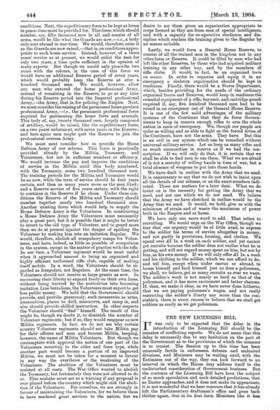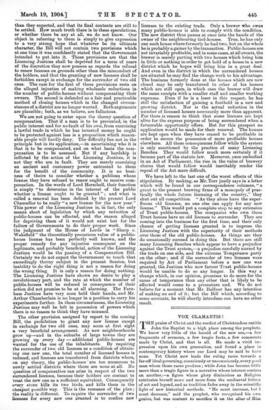THE NEW LICENSING BILL.
IT was only to be expected that the delay in the introduction of the Licensing Bill should be the occasion of conflicting reports. We do not mean that this delay is necessarily due to any hesitation on the part of the Government as to the provisions of which the measure is to consist. The Session up to this time has been unusually fertile in unforeseen debates and undesired divisions, and Ministers may be waiting until, with the Estimates out of the way, they can look forward to an interval in which the House may address itself to the undisturbed. consideration of Government business. But the contents of the Licensing Bill have been the subject of so much speculation and such detailed predictions, that as Easter approaches, and it does not make its appearance, it is not wonderful that we hear rumours that it has already left the Parliamentary draftsman's office and gone back thither again, that in its first form Ministers like it less than they expected, and that its final contents are still to be settled.. How much truth there is in these speculations, or whether there be any at all, we do not know. Our object in referring to them is simply to give expression to a very strong hope that whatever be its ultimate character, the Bill will not contain two provisions which at one time it was confidently stated that the Government intended to put into it. These provisions are that the Licensing Justices shall be deprived for a term of years of the discretion they now possess as regards the refusal to renew licenses on grounds other than the misconduct of the holders, and that the granting of new licenses shall be forbidden except in exchange for the surrender of two old ones. The case for the first of these provisions rests on the alleged injustice of making wholesale reductions in the number of public-houses without compensating their owners. The second is defended as a fair and practicable method of closing houses which in the changed circum- stances of a district are no longer wanted. Both arguments are plausible; both, as we believe, are fallacious.
We are not going to enter upon the thorny question of compensation. That if a man is to be prevented, in the public interest and for no fault of his own, from exercising a lawful trade in which he has invested money he ought to be protected against loss is a proposition which reason- able people will hardly deny. The difficulty lies not in the principle but in its application,—in ascertaining who it is that is to be compensated, and on what basis the com- pensation is to be assessed. But if any hardship is infficted by the action of the Licensing Justices, it is not they who are in fault. They are merely exercising an ancient and customary power entrusted to them for the benefit of the community. It is no busi- ness of theirs to consider whether a publican whose license they have refused to renew ought to receive com- pensation. In the words of Lord Herschel, their function is simply "to determine in the interest of the public whether a license ought to be granted " ; and what is called a renewal has been defined by the present Lord Chancellor to be really "a new license for the new year." This power of the Licensing Justices is, in fact, the only means short of legislation by which any reduction of public-houses can be effected, and the reason alleged for depriving them of it would not exist but for the failure of Governments to do their proper work. Since the judgment of the House of Lords in "Sharp v. Wakefield" the theoretically precarious value of a public- house license has been perfectly well known, and the proper remedy for any injustice consequent on the legitimate, and probably beneficial, action of the Licensing Justices would be the passing of a Compensation Bill. Certainly we do not expect the Government to touch that exceedingly thorny subject in the present Session, but inability to do the right thing is not a reason for doing the wrong thing. It is only a reason for doing nothing. The Licensing Justices have shown no desire to play a revolutionary part, and the rate at which the number of public-houses will be reduced in consequence of their action did not promise to be at all alarming. The Farn- ham Justices have very soon held their hands, and Mr. Arthur Chamberlain is no longer in a position to carry his experiments further. In these circumstances, the Licensing Justices may well be left in possession of powers which there is no reason to think they have misused.
The other provision assigned by report to the coming Bill, the prohibition to grant any new license except in exchange for two old ones, may seem at first sight a very beneficial arrangement. As new neighbourhoods grow up—and in the suburbs of large towns they are growing up every day — additional public-houses are wanted for the use of the inhabitants. By requiring the surrender of two old licenses as a condition of obtain- ing one new one, the total number of licensed houses is reduced, and licenses are transferred from districts where, on any theory, the public-houses are too numerous to newly settled districts where there are none at all. No question of compensation can arise in respect of the two surrendered licenses, because their holders are content to treat the new one as a sufficient equivalent. Consequently every stone kills its two birds, and kills them in the cheaiest possible way. This is the romance of the plan; the reality is different. To require the surrender of two licenses for every new one granted is to confine new licenses to the existing trade. Only a brewer who owns many public-houses is able to comply with the condition. The new district thus passes at once into the hands of the owner of the neighbouring tied-houses. True, he has only one such house where formerly he had two, but on the whole he is probably a gainer by the transaction. Public-houses are not invariably profitable, and in some cases, at all events, the brewer is merely parting with two houses which bring him in little or nothing in order to get hold of a house in a new district which he hopes will bring him in a great deal. And even in the district in which the surrendered houses are situated he may find the change work to his advantage. The business formerly done at the houses which are now closed may be only transferred to other of his houses which are still open, in which case the brewer will draw the same receipts with a smaller staff and smaller working expenses. Even if he is a loser in this respect, he has still the satisfaction of gaining a foothold in a new and growing district. Nor is the actual reduction in the number of licensed houses necessarily more than apparent. For there is reason to think that some licenses are kept alive for the express purpose of being surrendered when a favourable opportunity offers. But for this prospect no application would be made for their renewal. The houses are kept open when they have ceased to be profitable in order to secure the possession of more profitable houses elsewhere. All these consequences follow while the system is only sanctioned by the practice of many Licensing Benches. They would follow much more certainly if it became part of the statute law. Moreover, once embodied in an Act of Parliament, the rise in the value of brewery shares that would follow would inevitably render the repeal of the Act more difficult.
We have left to the last one of the worst effects of this stipulation. By making, as Mr. Torr justly says in a letter which will be found in our correspondence columns, ",a grant to the present brewing firms of a monopoly of prac- tically the whole future licensing of the country," they shut out all competition. "As they alone have the super- fluous old licenses, no one else can apply for any new license." This would put a complete stop to any extension of Trust public-houses. The companies who own these Trust houses have no old licenses to surrender. They are coming into the business for the first time, and their only chance of getting licenses granted is to impress the Licensing Justices with the superiority of their methods over those of the old public-houses. As things are they do occasionally succeed in doing this. But there are still many Licensing Benches which appear to have a prejudice against the Trust system,—a prejudice carefully nursed by the trade on one side, and the extreme Temperance party on the other ; and if the surrender of two licenses were required by Act of Parliament before a new one was granted, the Justices who now favour Trust public-houses would be unable to do so any longer. In this way a change which, in our opinion, promises to do more for the cause of temperance than any other that is likely to be effected would come to a premature end. We do not believe for a moment that Mr. Balfour has any intention of making an end of it; but the Bill which, according to some accounts, he will shortly introduce can have no other result.











































 Previous page
Previous page